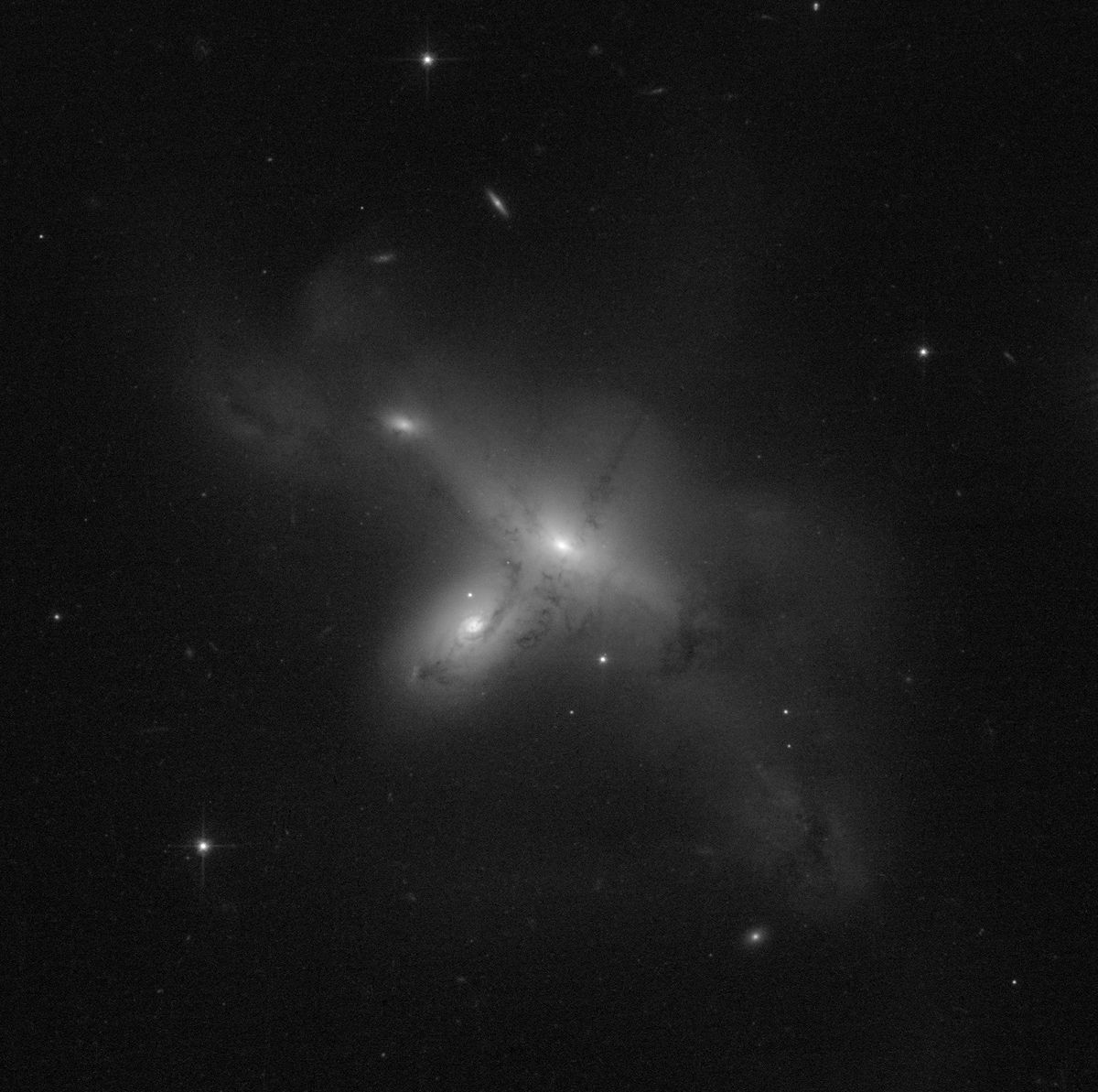The sublime terror of a distant galactic catastrophe
The Hubble telescope peeps up the universe's dress and shows us a miracle

The first season of Star Trek The Next Generation isn't known as the best
The show was still finding its feet and heavily under the influence of Gene Roddenberry's radical 1960s hippie humanism. The Enterprise was a free-wheeling bath house in space back in those days.
Bad execution, but even when the episodes were cheesy and badly-executed, some of them at least had neat ideas behind them.
One episode that sticks in Your Host's memory is the one where an engineer shows up to upgrade the warp drive. The experiment seems to work, warping Our Heroes off into the unknown at record speed.
But something goes wrong. The experiment gets out of hand, rocketing the ship straight out of the galaxy.
They end up at M33, the Triangulum Galaxy, the second-closest spiral galaxy after Andromeda... putting them about three million light-years from home.
Not bad for the time it takes Picard to say "engage".
Forget whatever else happened in the episode, love it or hate it.
This is one of the few times that Star Trek actually dealt with the vastness of space and real astrophysical phenomena. Most episodes show us contrived politicking with forehead aliens, or made-up "space anomalies" that may as well be wizards hurling fireballs.
I always think back to that episode when I look at Hubble's pictures of remote galaxies
Every point of light in that image of the colliding galaxies could be a star just like ours.
And you understand that what you're seeing happened millions of years in our "past". (If you can still keep track of things like past and future over these distances.)
You understand that consciously. The sheer scale of the image makes it impossible for our tiny monkey-brains to really get it.
The best we can do is fumble around with awkward metaphors. It's like a cyclone in space.
When it hits you, the immensity of what you're seeing is enough to make you feel like a speck of nothing. Less than that.
A galaxy is so vast in space and in time that it is like nothing else in our experience.
That's amazing and terrifying at the same time.
That combination of exhilaration and fear is called the Sublime
What's out there?
Is there anybody there, like us, looking up at the sky of their modest planet watching the fireworks as another galaxy impacts their own?
Your imagination can run away with you just looking at pictures of these beautiful whirling nightmares.
Arthur Schopenhauer, famed philosopher and notorious curmudgeon, wrote about the concept of the sublime, which mixes the pleasure we take in enjoying beauty with the fear and terror of facing down a scene which is threatening or even hostile.
The sublime comes in many forms, by differing degrees. An empty landscape, a desert where not even plants live, represents a certain physical threat to us. We could not survive there long.
The vastness of space and time is another object of sublime experience:
If we lose ourselves in the contemplation of the infinite greatness of the universe in space and time, meditate on the thousands of years that are past or to come, or if the heavens at night actually bring before our eyes innumerable worlds and so force upon our consciousness the immensity of the universe, we feel ourselves dwindle to nothing; as individuals, as living bodies, as transient phenomena of will, we feel ourselves pass away and vanish into nothing like drops in the ocean.
Schopenhauer is no Lovecraft, though:
But at once there rises against this ghost of our own nothingness, against such lying impossibility, the immediate consciousness that all these worlds exist only as our idea, only as modifications of the eternal subject of pure knowing, which we find ourselves to be as soon as we forget our individuality, and which is the necessary supporter of all worlds and all times the condition of their possibility.
That awe and fear of the sublime shrinks the ego down to nothing... and at the same time it frees us from our selfish obsessions.
The sublime experience reminds us that we are still here, feeling these emotions, having these experiences of the vast and awful and beautiful.
There's still a place for us even in an ugly, threatening universe.
Meditating on the depths of space, all the strange and beautiful things in it, the knowledge that these things are deadly and hostile to us, that is both terrifying and breathtaking.
When you think about it that way...
It's kinda weird that space opera sci-fi doesn't have much to do with space
How many times in popular space opera do you see them deal with the real stuff of space?
It happens. But not often.
Maybe it shouldn't. We're not watching Star Wars to learn about astronomy. We're tuning in to watch spaceships zip around and blast each other with ray-guns.
The fact these fairy story romances happen on a ship in space is incidental background. The real interest is in the tension and conflict and drama.
But you can't help but feel they're missing a golden opportunity.
I can look at that picture of the colliding galaxies all day long.
There's something magical and even seductive about it. I can't parse the sheer scale of it. It's almost certainly full of things that would kill me instantly.
But it's overflowing with possibilities. And the experience itself is thrilling in a way that you can't quite put into words.
The power of space opera is in the awe and terror of space
Don't get me wrong. I'm not arguing against the "romance story" told in space.
I'm not suggesting that science fiction should be diamond-hard.
What I'm saying is that there's a unique power in stories that can appreciate the enormity of space and time and the hostility of the universe to human life.
The stories themselves don't have to be tragic. Although speaking for myself, stories like Alien and even Prometheus work so well not only because they're tragedies, but because they bake in an encounter with the sublime.
Ash: You still don't understand what you're dealing with, do you? The perfect organism. Its structural perfection is matched only by its hostility.
Lambert: You admire it.
Ash: I admire its purity. A survivor. Unclouded by conscience, remorse, or delusions of morality.
We're drawn to this kind of story because it shows us a glimpse of the teeth hiding in the shadows. Although even here, the "space" angle is almost incidental. The Nostromo could be a haunted mansion. Prometheus tells Lovecraft's "At the Mountains of Madness" on the uninhabitable moon of a remote gas giant.
Who uses the vast hostility of space to good effect?
The great-granddaddy in the modern age would have to be Olaf Stapledon's Star Maker and Last and First Men. These aren't so concerned with the hostility of the universe, but they do make a good effort at comprehending the scale.
Stephen Baxter's Xeelee stories are fantastic at capturing this sense of enormous wonder and terror that this brings. Baxter's stories are often criticized for paper-thin characterizations and simple plots. Read Baxter for the scope and audacity of the ideas.
Alastair Reynolds's Revelation Space universe captures the size and hostility of the universe, showing us characters striking out and surviving against the odds. They're often tragic stories, though a glimmer of hope avoids slipping into cold nihilism.
These stories aren't as optimistic as Star Trek
And they aren't as human-centered as fantasy stories.
As a setting for your characters and a source of unique problems, they open up options that aren't possible here on Earth or in fantastic sub-created worlds.
Space and all the crazy stuff in it opens up storytelling possibilities that ought to fertilize the imagination with the sublime and the tragic.
Weird tales, horror tales, fantastic tales, and, yes, science fiction tales can all play with these themes.
Show us tragedy, show us the hostile wonders of nature.
Those lonely distant galaxies are fertile ground for your writerly imagination
PS – If you enjoy these posts, why not subscribe? That way you can receive them directly in your inbox... and you'll get the members-only posts.
There's no charge (yet) to subscribe as a free member, so click here and join now.

